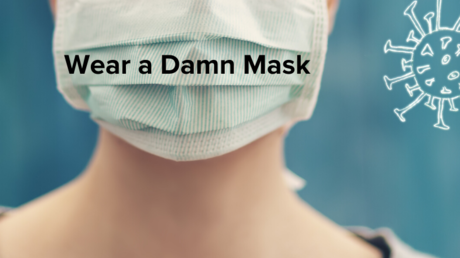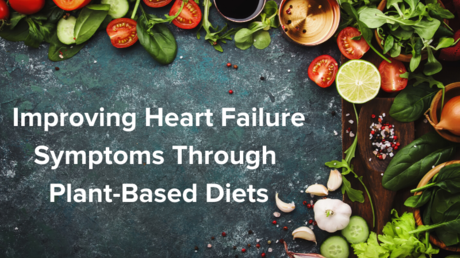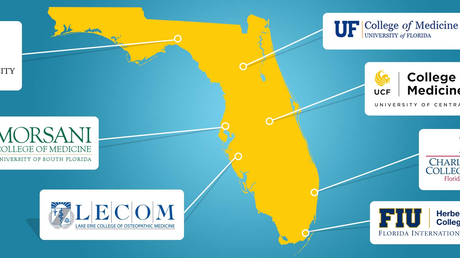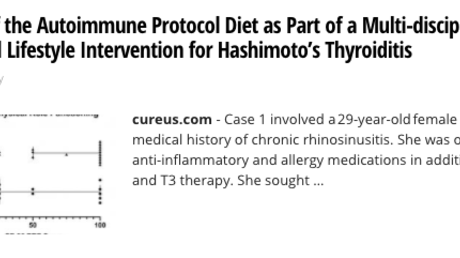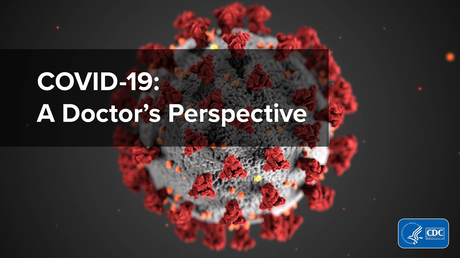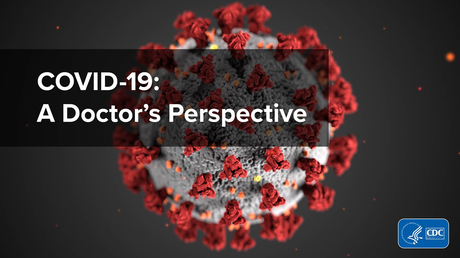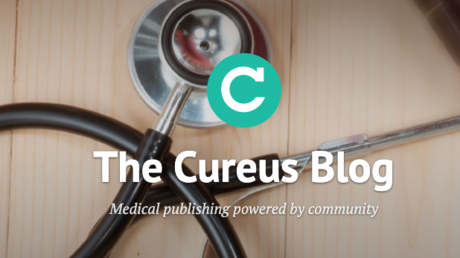Newsroom
Doctors' Health and Burnout
An article on burnout in the United States among healthcare professionals published in Cureus received press in MD Links. Read the Cureus article: Burnout in United States Healthcare Professionals: A Narrative Review Read the story from MD Links: The top factors devastating doctors' health.
Aug 06, 2020
Study Suggests: Women With Sarcoidosis Have Higher Mortality Risk From Heart Conditions
Read the Cureus article: Gender Differences in Rates of Arrhythmias, Cardiac Implantable Electronic Devices, and Diagnostic Modalities Among Sarcoidosis Patients Click the link below to see the news story.
Jul 17, 2020
Wear a Damn Mask, PLEASE!
Read the latest blog post from Cureus Editor-in-Chief, John R. Adler, Jr., M.D. When Covid first appeared in the US, several Asian physician friends had simple advice for me, “Wear a mask.” Having dealt with various coronaviruses for over a decade, this was the fundamental lesson taken from dealing with and controlling these respiratory viruses. Now, I may only be a dumb neurosurgeon, (said with humility, irony and in jest), but I know a thing or two about masks, having spent 30 years of life wearing them, sometimes for 12 or more hours at a time. There is nothing pleasurable about wearing a mask, but I have experienced first-hand how masks can protect patients and physicians from illness. More broadly I have seen how masks can protect healthcare workers from the worst of infectious diseases, even giving them supernatural-like protection when they must enter the belly of the beast while caring for highly contagious and fatal illnesses like Ebola. Meanwhile, each and every day, healthcare workers all over the world, including my own family members are able to avoid infection while caring for hospitalized Covid patients who are often spewing the virus everywhere. It’s incontrovertible - masks truly work!; they prevent Covid infections. So why is it that some people contest the efficacy of masks and refuse to wear them? Perhaps they’ve heard claims that wearing a mask poses a health risk such as hypoxia (when the body is deprived of oxygen) or hypercapnia (excessive carbon dioxide in the bloodstream). A plastic bag might do such a thing but certainly never a cloth mask, the preferred personal protection equipment (PPE) for the public. More sophisticated surgical masks and N95 respirators tend to fit more tightly than a cloth mask but they never result in hypoxia or hypercapnia. Meanwhile these more sophisticated tight fitting masks are generally reserved for healthcare professionals who sometimes can be literally engulfed in a cloud of airborne Covid-19 particles when dealing with very sick patients. No matter, masks trap only a tiny bit of carbon dioxide which is why as a surgeon I could wear one all day while performing very demanding surgeries. Even most patients with asthma and chronic obstructive pulmonary disease, or COPD, can AND SHOULD wear masks unless they are in the middle of an extreme exacerbation of their disease. So damn it, why can’t y’all just wear masks when in public? Deep down I am a lifelong libertarian, and truly cherish freedom as much as any, but to equate wearing a mask with subjugation is just plain stupid. Neither is going maskless some expression of courage! I am asking you to wear a mask not to protect yourself, but so that you might protect other people, especially truly vulnerable individuals. OK, maybe you don’t give a sh*t about yourself or others; then wear a mask because you don’t want to be poor. Rampant Covid infections are interfering with US domestic economic activity but especially between the US and the rest of the world. If you haven’t heard, or experienced first-hand, Covid is really REALLY bad for the US economy. So what is it? What is your excuse for not wearing a mask when you are in public? Damn it, you are out of excuses. Covid-19 may be one badass virus, but it turns out it is no match for masks. So please, please, please wear a mask… and by the way, wash your hands too!
Jul 06, 2020
Improving Heart Failure Symptoms Through Plant-Based Diets
An article on the potential intervention of heart failure recently published in Cureus received press in AJMC and The Beet. Read the Cureus article: Plant-Based Diet: A Potential Intervention for Heart Failure Click the links below to see the news stories.
Jul 02, 2020
Florida medical schools partner with Cureus to publish their medical research
Majority of Florida's medical schools (7 out of 10) will direct their faculty, residents and students to publish their research in Cureus. University of Central Florida College of Medicine has been in partnership with Cureus for the last 4 years publishing close to 150 articles in it's Flagship Academic Channel. Now this channel is being expanded to allow most of Florida's medical schools to publish with Cureus also. Please read part of the UCF news article below or click here for the full article.
Apr 23, 2020
Gastrointestinal Symptoms of COVID-19
A COVID article on gastrointestinal symptoms recently published in Cureus received a lot of Italian press amidst the coronavirus crisis in Italy. Read the Cureus article: Gastrointestinal Infection Could Be New Focus for Coronavirus Diagnosis Click the links below to see the news stories.
Apr 10, 2020
COVID-19 and the Titanic Dilemma: Which Patients Get Priority?
Read the latest blog post from Cureus Editor-in-Chief, John R. Adler, Jr., M.D. Passengers, frightened by the Titanic sinking beneath them and knowing that there were not enough lifeboats to go around, had mere minutes to prioritize who among them might be saved. Steerage passengers were largely left to fend for themselves. Among everyone else it was implicitly understood that children would be saved first. In fact, this necessity of sacrificing ourselves for younger generations is as old as humanity. This hierarchy of sacrifice for a “greater good” resonates deeply within all cultures and is part of why the movie Titanic is so beloved worldwide. Fast-forward to Spring, 2020, where we find ourselves trapped on a metaphorical ship. This time we have tragically struck an invisible microbe precipitating the current Covid-19 pandemic. Starting first in Wuhan, then Northern Italy, Spain and France, and now bearing down with all its fury on the United States, Covid-19 is challenging the moral framework of our society, and even our identities as compassionate humans. At the heart of this calamity is a subset of very sick patients requiring prolonged respiratory support from a finite pool of ventilators. Anticipating a tragic necessity to ration these life-saving devices, a handful of US states, and most recently The University of Pittsburgh (UPMC), have developed a range of “guidelines.” Some states have chosen to consider age, advanced cancer and intellectual impairment as relevant considerations for rationing ventilators. However disability and elder rights groups, seeking to represent their constituencies, have recently and successfully pushed back hard. Specifically, these lobbying groups have raised objections to the US Office of Civil Rights, arguing that hospitals (via state guidelines) were being “ordered to not offer mechanical ventilator support for patients” with “severe or profound mental retardation,” “moderate to severe dementia,” and “severe traumatic brain injury.” Memorializing these civil liberty objections, the ivory tower team of UPMC medical ethicists has developed their own set of “guidelines,” to which “100s of hospitals” are now poised to sign up. The group think, the politics, the idiocy of where we now find ourselves in this health rationing debate, leaves me dumbfounded. Mortified. Stupefied. What I am hearing is that society’s politically savvy actually subscribe to the notion that a 90-year-old Alzheimer’s patient, a vegetative head injury patient, or an end stage cancer patient should have the same access to a proverbial lifeboat as a healthy 18-year-old. How can our collective judgment now be so impaired? How is it that our ancestor’s self-evident notions have been washed away during the current panic? In no way do I wish to suggest a healthy Down’s Syndrome or vigorous cystic fibrosis adult not be given a fair shot at a life saving ventilator. However to not acknowledge that “fairness” can involve a hierarchy of intellectual, medical and “chronological” disability is beyond foolish. Hopefully such indifference to OUR collective future will not prove to be the final legacy of the “greatest generation”? Fortunately I am reassured by the many senior and disabled individuals with whom I have discussed the current intellectual brouhaha. Each of these many family members and friends are, like me, utterly dismayed that we are even having this debate. So let me end by being thoroughly blunt. If at some juncture a medical team with only one ventilator needs to choose point blank between saving me, a healthy 65-year-old, and the life of a much younger and reasonably healthy patient, please do not hesitate - let me die. Does anyone want to live in a world that has forgotten the wisdom of the ages?
Apr 06, 2020
The COVID-19 Pandemic is Not a Surprise
Read the latest blog post from Cureus Editor-in-Chief, John Adler. If you'd like to leave a comment for Dr. Adler, please click here to comment on the post itself. John R. Adler, Jr., M.D. - March 2, 2020 Right now it is impossible to ignore the financial markets panicking, the breathless coverage by news media, the fearful buying at Costcos everywhere, and so many friends and family now worried about the emerging Covid-19 pandemic. Predictions of what might come next raise the specter of an historic pandemic that could literally kill millions or dare I say tens of millions before it runs its course. We are clearly living in an “interesting” time. Media often nurtures the collective myth that modern medicine is capable of miracles, and in recent years some in Silicon Valley even implied that humanity could be on the cusp of conquering death itself. Fueled by so much optimism, we, and especially the young adults among us, live in a world grown complacent about premature dying and now finds itself shocked at our shared reality; modern medicine has not solved the “death problem.” Philosophically speaking, and as a physician who has seen more than his fair share of deaths, I do not necessarily find our communal predicament tragic. Yes, it is quite possible that countless individual tragedies will abound in the months to come, However, as my neurosurgical profession taught me at a young age, death is never far away, even though we may have chosen to believe otherwise. What is not a surprise, or should not be a surprise, is that the Covid-19 pandemic is occurring in the first place. Human beings are merely one life form among many on earth. Why then should we think of ourselves as being exempt from the fundamental principles of biology? As human numbers approach 8 billion there is an increasing need for urbanization, and with urbanization massive densely populated cities have emerged. Not unlike the situation on factory farms, high population density of any life form is a set up for the rapid spread of infectious disease. It takes heroic and often unnatural public health efforts to compensate for such ecological pressures, much like the antibiotics used in animal feedlots. Meanwhile, modern medicine enables a continuously growing elderly or otherwise infirm population to keep on living and it is these individuals who are far and away the most susceptible to Covid-19. As a 65-year-old man, I am not unaware of the fact that 100 years ago life expectancy was little more than 30. The huge population of elderly and other individuals with compromised health who are alive today would not have lived a century ago, yet they are a natural target for infectious disease. There are reasons to celebrate urbanization and growing old, yet our species should not be unmindful of the infectious disease opportunities that these changes engender. If not Covid-19, other pandemics can and will emerge. That is our human reality that medicine will be hard pressed to ever “solve.” So what to do? Sorry to say, there is no solution. Rather my simple advice would be to use the present pandemic as a wake-up call to appreciate whatever life we have before us. As Steve Jobs famously once said, “Death is very likely the best single invention of life.” Let’s wisely use that which remains. And don’t forget to wash your hands!
Mar 03, 2020
Read the latest story in our Blog
Check out the latest blog post from Cureus Editor-in-Chief, John Adler. If you'd like to leave a comment for Dr. Adler, please click here to comment on the post itself. Is it Time to Pull Back the Curtain from Peer Review? John R. Adler, Jr., M.D. - December 13, 2019 Double-blind and single-blind processes continue to dominate academic peer review. Too often this results in a ‘black box’ – a system without sufficient transparency for authors, readers and reviewers alike. Hopefully one day fully transparent (and even public) peer review will come to be seen as acceptable throughout the world of academic publishing. For now we must take small steps to break down this barrier, just as Cureus works to break down barriers to publication. That’s why Cureus provides authors with the ability to reach out directly to invited peer reviewers with a personal message before peer review begins. Yes it is quite unorthodox for an author to make a personal plea to reviewers to complete expeditious reviews, so why do we seek to encourage it? A personal request is at some level harder to ignore, and therefore more effectively motivates reviewers and speeds up the process, than a request coming from a “faceless” journal. The author is blinded to the exact reviewer panel as each author is expected to invite at least five reviewers and the editorial team invites a similar number of other reviewers. With this many “potential” reviewers, it is easy to argue that the author will never be exactly sure who reviewed their article, so in effect, authors are blind to the exact reviewer’s name. Cureus still believes and hopes someday to validate that it is not the primary review process that ensures article quality but the secondary review, ala SIQ, which should therefore be deemed the best arbiter of quality, and this is a feature that other journals lack. These rationale may be less than perfect, but they summarize our current thinking, yet as we all know, there isn’t a perfect journal or system for peer review.
Jan 28, 2020
Wired Magazine article on Cureus
Quotes from the Wired Magazine article: “Cureus is the first and only peer-reviewed publication with step-by-step article templates for authors—which dramatically speeds up publication times.” "If case studies are published in weeks instead of months, that means millions more medical lessons to learn from." “We’re missing a lot of the science because so many journals don’t see case reports as publishable” “That kind of data is hard to get into a high impact journal. But in the clinic, this is the kind of stuff my patients are asking me." Click here to read the article: https://www.wired.com/story/a-new-way-for-doctors-to-share-their-medical-mysteries/
Jan 22, 2020


